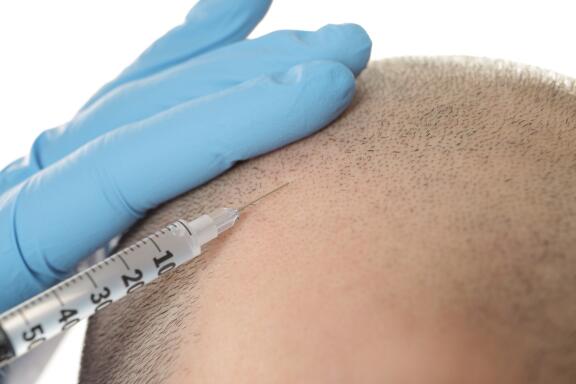How to fight hair loss
- The causes of hair loss
- Secondary syphilis and hair loss
- Spot baldness and hair loss
- Scarring alopecia
- Hair loss due to ringworm of the scalp
- Hair loss and Covid
- Hair loss and the pill
- Pregnancy and hair loss: everything you need to know
- Hair loss and menopause
- Hair loss due to stress: reactional hair loss
- What is traction alopecia?
- Hair loss: the impact of iron, zinc, vitamin D, C and B12 deficiencies
- Drug-induced hair loss
- Hair loss and hormones
- Hair loss and genetics
- Hair loss and fatigue

How to fight hair loss
Reactional hair loss and chronic hair loss have different causes. So, it makes sense that they are not treated in the same way. So, what can you do in case of hair loss? Find out what to do according to the different types of hair loss and the pathophysiological mechanisms involved.
Hair loss and alopecia: why you should consult a specialist quickly.
Not all types of hair loss are alike and to determine the exact cause of your hair loss, you must consult a specialist or a health professional as soon as possible. You should do this as soon as the first symptoms start to appear. Hair loss by the handful over a period of 3 to 6 months, hair becoming dull, dandruff or itching, irritation or simply the impression of seeing your scalp through your hair are signs that should alert you.
Dermatologists are true scalp specialists and the best healthcare professionals to identify the type of hair loss that is affecting you and tell you what to do to fight hair loss. Hair loss is a frequent reason for dermatology consultations. Reactional hair loss should not be confused with chronic alopecia such as androgenetic alopecia, anagen effluvium or other forms of hair loss. The former is completely reversible, whereas androgenetic alopecia can be more difficult to treat. So, the treatments used to fight hair loss must be adapted to your needs.
What to do for hair loss
Reactional hair loss can have several causes: an ill-adapted pill, hormonal variations, the post-partum period, a vitamin or mineral deficiency (due to a diet for example), a change of season or intense stress.
In any case, taking a closer look at your lifestyle and adopting the right habits so that the hair loss does not get worse, are a must.
Every day, people suffering from hair loss wonder how to fight it Watching what goes onto your plate is very important. Efficiently growing good quality hair involves different stages of cell proliferation requiring oxygen and a number of different nutrients. When the follicle is properly nourished by blood flow, and sufficient vitamins and minerals are supplied, hair grows healthy and strong. So, a food supplement to fight against hair loss, made with essential vitamins and minerals, can be an interesting therapeutic solution.
At the same time, refine your hair routine by using the right products. To avoid further damaging hair that already has a tendency to fall out, we advise using gentle cleansing products that respect the scalp. Do not hesitate to use a shampoo to slow down hair loss and an anti-hair loss treatment such as anti-hair loss lotion. It is easy to apply, usually without rinsing, and helps slow down hair loss. The only prerequisite is to choose the right anti-hair loss treatment for your type of hair loss.

What to do for alopecia
In both men and women, unlike with reactional hair loss, the cause of chronic alopecia can sometimes be more difficult to manage.
What to do for alopecia and hair loss in men
Androgenetic alopecia, a form of chronic localized hair loss, is characterized by episodes of hair loss that progress towards the miniaturization of the hair shaft and lead to a decrease in hair density. The mode of onset for androgenetic alopecia is mainly hormonal and involves the androgen receptors present at the hair root. Testosterone overstimulates the hair root accelerating the hair life cycle and exhausting the hair root too quickly.
In the case of androgenetic alopecia, dermatologists can prescribe treatment based on anti-hair loss medication. Currently, there are two that have been approved for men: minoxidil and anti-androgen drugs such as finasteride. These treatments generally have the power to stabilize hair loss but they do not stop it. Hair implants are also a solution to lastingly recover hair density and even distribution.
How to fight female alopecia
Even though this term can seem frightening, behind this type of hair loss lies the same chronic telogen effluvium. A progressive form of hair loss lasting more than 6 months that generally affects women between the ages of 30 and 50. The cause? The shortening of the anagen phase (growth phase) is the most commonly mentioned cause by healthcare professionals. The result is shorter hair that goes through the hair cycle faster and falls out more quickly. Once again, do not wait, consult a specialist as soon as possible to find the cause or the trigger of the hair loss.
If the hair loss is accompanied by a loss of density on the top of the head, it may be female androgenetic alopecia. In this case, the healthcare professional can prescribe anti-hair loss medication authorized for women, such as minoxidil.
Dermatological expertise
To better understand your skin and hair, discover our exclusive content and innovative care products designed to improve your quality of life..
